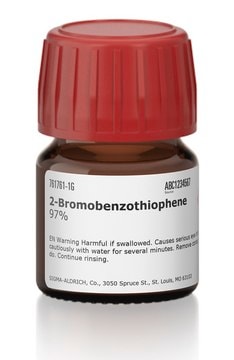Wichtige Dokumente
523666
3-(Trimethylsilyl)phenylborsäure
≥95.0%
About This Item
Empfohlene Produkte
Assay
≥95.0%
Form
solid
mp (Schmelzpunkt)
145-150 °C (lit.)
SMILES String
C[Si](C)(C)c1cccc(c1)B(O)O
InChI
1S/C9H15BO2Si/c1-13(2,3)9-6-4-5-8(7-9)10(11)12/h4-7,11-12H,1-3H3
InChIKey
REMKRZLFPLDTKR-UHFFFAOYSA-N
Anwendung
- To prepare a 2-phenylpyridine ligand, which is used in the synthesis of Ir(III) complex applicable in the OLEDs.
- As an intermediate in the preparation of biphenyl derived amino acids.
- As a starting material for the synthesis of triphenylene-based electron transport materials.
Sonstige Hinweise
Lagerklassenschlüssel
13 - Non Combustible Solids
WGK
WGK 3
Flammpunkt (°F)
Not applicable
Flammpunkt (°C)
Not applicable
Persönliche Schutzausrüstung
Eyeshields, Gloves, type N95 (US)
Hier finden Sie alle aktuellen Versionen:
Analysenzertifikate (COA)
Die passende Version wird nicht angezeigt?
Wenn Sie eine bestimmte Version benötigen, können Sie anhand der Lot- oder Chargennummer nach einem spezifischen Zertifikat suchen.
Besitzen Sie dieses Produkt bereits?
In der Dokumentenbibliothek finden Sie die Dokumentation zu den Produkten, die Sie kürzlich erworben haben.
Unser Team von Wissenschaftlern verfügt über Erfahrung in allen Forschungsbereichen einschließlich Life Science, Materialwissenschaften, chemischer Synthese, Chromatographie, Analytik und vielen mehr..
Setzen Sie sich mit dem technischen Dienst in Verbindung.![[Pd(OAc)2]3 reagent grade, 98%](/deepweb/assets/sigmaaldrich/product/structures/508/249/99a0ef2c-b77c-4d73-8ed9-0cca05b6b41f/640/99a0ef2c-b77c-4d73-8ed9-0cca05b6b41f.png)







